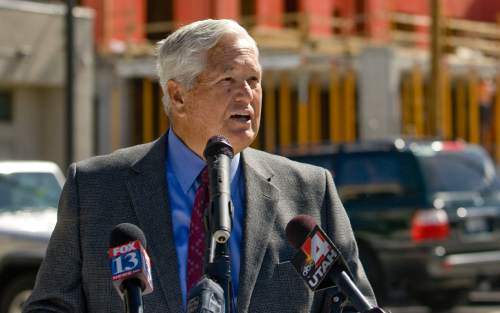This is an archived article that was published on sltrib.com in 2016, and information in the article may be outdated. It is provided only for personal research purposes and may not be reprinted.
Utah Transit Authority Board Chairman H. David Burton said Friday that the real reason his board is closing its committee meetings to the public is that it doesn't like The Salt Lake Tribune's coverage of them.
"You really want to know the truth?" Burton told a Tribune reporter asking why the meetings are now closed. "Because you screw us up."
He said the newspaper's coverage of committee discussions has made "the public perception that it is fait accompli, the decision is made" on issues — and "the public doesn't know the difference" between early discussion and final approval by the way stories are reported.
Also, because only a few of the board's 16 members attend each of the different committee meetings, he said, "Two-thirds of our board hears about issues from you rather than us. That's an intolerable situation for us to deal with."
Interim UTA President and CEO Jerry Benson added in the hallway interview that no matter the issue, he believes The Tribune always finds "a way to give it the worst spin, and concoct — if you have to — whatever facts you can."
The tape-recorded interview occurred after Burton and Benson made UTA's annual report Friday to the Utah Transportation Commission — which oversees the Utah Department of Transportation. Some of its members criticized UTA's decision to close its committee meetings at the same time the transit agency is vowing more transparency.
UTA earlier this week acknowledged that it is moving committee meetings behind closed doors, saying it did so because those subgroups will no longer make any final decisions — which now all will be handled by the full board.
However, Jeff Hunt, a media and First Amendment attorney, says the change violates Utah's open-meetings law, which applies to advisory groups.
Politicians, including Gov. Gary Herbert and his Republican primary opponent, Jonathan Johnson, also criticized the move.
UTA committees often have worked through issues to the point that passage later by the full board has come with little or no debate. News-media coverage of committees often gave early notice of UTA actions under consideration.
Now, Burton acknowledged, the full board intends, generally, to vote on issues the same day they first are debated. But he said plans call for posting agendas and background materials earlier, and for giving the public more ability to comment online or in full board meetings about those issues.
Burton told the Utah Transportation Commission on Friday those changes are part of reforms that have included reining in high executive pay and international travel, and making other ethics reforms.
"It's no secret that one of the biggest issues facing the UTA is public trust," Burton told the commission.
He said trust is essential for the public to pass sales-tax increases that UTA needs for expanded service, noting the defeat last year in Salt Lake and Utah counties of Proposition 1 to bolster funding for transit and roads.
UTA is using a new branding motto: "You can depend on UTA" amid its reforms, he said. "We will continue to find ways to be far more transparent in the public sector."
The most important thing to the agency, he said, "is public trust, it's public trust, and it's public trust."
Utah Transportation Commission Chairman Kent Millington asked, if public trust and transparency are so key, why is UTA closing its committee meetings to the public?
"It was given an unfair twist in the media," Benson responded.
He said few people attended the committee meetings "and there was no opportunity for public comment." He said the changes will allow more public comment at full board meetings, aided by planned earlier release of agendas and background materials.
Millington then asked why UTA still has committee meetings. Benson said, "If the board members need to ask questions or get information or explore maybe a new technology or a new direction for the agency, they may want to have an opportunity to discuss those with each other or staff."
Benson suggested that the Utah Transportation Commission also has such closed-door meetings with subgroups, but commissioner Meghan Holbrook disputed that.
"All our committees are open," she said, and added that it seems to her that UTA's should be as well. "I hate to see you take away from all the good things you are doing" with controversy over committees, said Holbrook, a former UTA Board member, appointed by the Transportation Commission.
After Benson said UTA is "increasing openness and transparency," Millington, another former transit board member, said, "I thank you for that, because it wasn't that way when I was on the UTA Board."
Millington told how board members then "were specifically told by UTA officials … that no more than half of the board would be present at any of the committee meetings because they would [otherwise] have to be open to the public."
UTA's closed-door committee policy changed in 2010, when then-new UTA Board Chairman Greg Hughes opened them, he said, to create more public trust.
Millington said going back to the old policy gives him "a little bit of a heartburn here."
Dannie McConkie, another transportation commission member who is its current appointee to the UTA Board, defended the agency.
"I believe UTA has made every effort to be as forthright as possible," he said.



